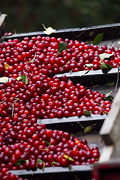Turkey: ITC to rule soon on dried cherry dumping
07/01/2020 12:00

Cherry growers in 2019 went on the offensive against overseas competitors they believed were unfairly pricing dried tart cherries.
The U.S. Department of Commerce on Dec. 6 officially agreed with that assessment and ruled that exporters from Turkey have been selling dried tart cherries in the U.S. at far less than fair value.
“The dumping of cherries by the Turks is having a sign-ificant negative impact on the cherry growers and pro- cessors in the Traverse City area,” Sen. Gary Peters (D-Michigan) said after he testified Dec. 3 before the United States International Trade Commission.
Possible action now is in the hands of the International Trade Commission, which expects to issue a decision on or about Jan. 21. If it agrees action is warranted, the U.S. will issue anti-dumping duty and countervailing duty orders.
Foreign companies that price their products in the U.S. market below the cost of production or below prices in their home markets are subject to anti-dumping duties. Companies that receive unfair subsidies from their governments, such as grants, loans, equity infusions, tax breaks or production inputs, are subject to countervailing duties aimed at directly countering those subsidies.
“Turkey is buying frozen cherries at $1.10 per pound, taking four pounds of frozen cherries, drying them into one pound of dried cherries, and selling them into the U.S. market at 89 cents per pound,” Leelanau cherry farmer Ben LaCross said in May. “To us, that’s textbook dumping.”
Anti-dumping and countervailing duty laws provide American businesses and workers with a mechanism to seek relief from the harmful effects of the unfair pricing of imports. The U.S. Department of Commerce currently maintains 500 anti-dumping and countervailing duty orders.
Underpriced cherries piled into the U.S. market in massive quantities in recent years. The Department of Commerce said imports of dried tart cherries from Turkey in 2018 were valued at an estimated $1.2 million.
A group of U.S. processors, seeking to even the playing field, petitioned the government to institute both an anti-dumping duty and a countervailing duty.
Nels Veliquette is on the board of directors at Shoreline Fruit LLC and is vice president and CFO for Cherries R Us/Cherry Ke. He also testified at the December ITC hearing. He said the U.S. cherry producers presented their case, then heard from the representative of a Turkish business.
“We had rebuttal from one of the Turkish producers,” Veliquette said. “Our case basically relies on official government statistics like bills of lading from customs. The Turkish company that came basically said ‘Don’t believe anything these people have told you, please accept our incomplete and sometimes contradictory self-reported data.’”
“It was very attentive and engaged. Much of their questioning was around our data. We spent a lot of time answering questions for them. They were very probing.”
Peters is pushing for rules changes that would ease the financial burden on U.S. businesses in any industry hurt by unfairly priced imports. Currently, the government cannot initiate the process that leads to import duties — a private company or trade group must shoulder the expense of presenting its case.
“This is not easy,” Peters said. “This is why this process has to be changed.
“Here we have a situation with cherry growers and processors in Traverse City who are facing incredibly difficult financial times as a result of unfair competition from the Turks. Even though they’re facing a financial crisis, they also have to come up with money in order to put together a very complicated case. It is expensive. It requires attorneys, economists, statisticians. This is something the federal government needs to do.”
An organization called the Dried Tart Cherry Trade Committee petitioned the government in the case of dried tart cherries. The group includes Cherry Central Cooperative in Traverse City, Graceland Fruit, Inc. in Frankfort, Payson Fruit Growers Coop in Payson, Utah), Shoreline Fruit, LLC in Traverse City, and Smeltzer Orchard Co. in Frankfort.
Even if the Department of Commerce begins charging the duties in January, that won’t completely clean up the dried cherry import problem for local growers.
“It doesn’t solve today’s issue entirely, but it’s going to keep it from getting worse,” Shoreline Fruit’s Don Gregory said. “The growth that we’ve seen has been so exponential in the last several years, coming in, that if it continued at that rate, there wouldn’t be a drying industry left after about five years. If we can put a stop to (dumping), that’s going to help.”
The action appears to be on track for January action.
“We have done our work,” Veliquette said. “We have made every effort to show the real harm that’s being done here. And that’s what we had to do. We had to demonstrate a real threat to our industry. We saw the numbers playing out and we saw our customers leaving for the cheaper imported cherries and we new we had to do something.”
“It will help even the playing field, especially on dried tart cherries,” Veliquette said of the duties. “But that’s not the only cherry product that comes out of Turkey.”
The U.S. Department of Commerce on Dec. 6 officially agreed with that assessment and ruled that exporters from Turkey have been selling dried tart cherries in the U.S. at far less than fair value.
“The dumping of cherries by the Turks is having a sign-ificant negative impact on the cherry growers and pro- cessors in the Traverse City area,” Sen. Gary Peters (D-Michigan) said after he testified Dec. 3 before the United States International Trade Commission.
Possible action now is in the hands of the International Trade Commission, which expects to issue a decision on or about Jan. 21. If it agrees action is warranted, the U.S. will issue anti-dumping duty and countervailing duty orders.
Foreign companies that price their products in the U.S. market below the cost of production or below prices in their home markets are subject to anti-dumping duties. Companies that receive unfair subsidies from their governments, such as grants, loans, equity infusions, tax breaks or production inputs, are subject to countervailing duties aimed at directly countering those subsidies.
“Turkey is buying frozen cherries at $1.10 per pound, taking four pounds of frozen cherries, drying them into one pound of dried cherries, and selling them into the U.S. market at 89 cents per pound,” Leelanau cherry farmer Ben LaCross said in May. “To us, that’s textbook dumping.”
Anti-dumping and countervailing duty laws provide American businesses and workers with a mechanism to seek relief from the harmful effects of the unfair pricing of imports. The U.S. Department of Commerce currently maintains 500 anti-dumping and countervailing duty orders.
Underpriced cherries piled into the U.S. market in massive quantities in recent years. The Department of Commerce said imports of dried tart cherries from Turkey in 2018 were valued at an estimated $1.2 million.
A group of U.S. processors, seeking to even the playing field, petitioned the government to institute both an anti-dumping duty and a countervailing duty.
Nels Veliquette is on the board of directors at Shoreline Fruit LLC and is vice president and CFO for Cherries R Us/Cherry Ke. He also testified at the December ITC hearing. He said the U.S. cherry producers presented their case, then heard from the representative of a Turkish business.
“We had rebuttal from one of the Turkish producers,” Veliquette said. “Our case basically relies on official government statistics like bills of lading from customs. The Turkish company that came basically said ‘Don’t believe anything these people have told you, please accept our incomplete and sometimes contradictory self-reported data.’”
“It was very attentive and engaged. Much of their questioning was around our data. We spent a lot of time answering questions for them. They were very probing.”
Peters is pushing for rules changes that would ease the financial burden on U.S. businesses in any industry hurt by unfairly priced imports. Currently, the government cannot initiate the process that leads to import duties — a private company or trade group must shoulder the expense of presenting its case.
“This is not easy,” Peters said. “This is why this process has to be changed.
“Here we have a situation with cherry growers and processors in Traverse City who are facing incredibly difficult financial times as a result of unfair competition from the Turks. Even though they’re facing a financial crisis, they also have to come up with money in order to put together a very complicated case. It is expensive. It requires attorneys, economists, statisticians. This is something the federal government needs to do.”
An organization called the Dried Tart Cherry Trade Committee petitioned the government in the case of dried tart cherries. The group includes Cherry Central Cooperative in Traverse City, Graceland Fruit, Inc. in Frankfort, Payson Fruit Growers Coop in Payson, Utah), Shoreline Fruit, LLC in Traverse City, and Smeltzer Orchard Co. in Frankfort.
Even if the Department of Commerce begins charging the duties in January, that won’t completely clean up the dried cherry import problem for local growers.
“It doesn’t solve today’s issue entirely, but it’s going to keep it from getting worse,” Shoreline Fruit’s Don Gregory said. “The growth that we’ve seen has been so exponential in the last several years, coming in, that if it continued at that rate, there wouldn’t be a drying industry left after about five years. If we can put a stop to (dumping), that’s going to help.”
The action appears to be on track for January action.
“We have done our work,” Veliquette said. “We have made every effort to show the real harm that’s being done here. And that’s what we had to do. We had to demonstrate a real threat to our industry. We saw the numbers playing out and we saw our customers leaving for the cheaper imported cherries and we new we had to do something.”
“It will help even the playing field, especially on dried tart cherries,” Veliquette said of the duties. “But that’s not the only cherry product that comes out of Turkey.”
Source: Record Eagle
Các tin khác
- More efforts needed to maintain export growth to China: Insiders (24/04/2024)
- Shadow trade minister calls for greater focus on removal of Chinese trade barriers (24/04/2024)
- New U.S. Solar Panel Tariff Intensifies Sino-American Green Tech War (24/04/2024)
- It is expected that there are higher orders and revenue in the second quarter from European businesses (24/04/2024)
- U.S. Ceramic Manufacturers Seeking Tariffs Against Indian Import (24/04/2024)
 Home
Home
 About Us
About Us




















